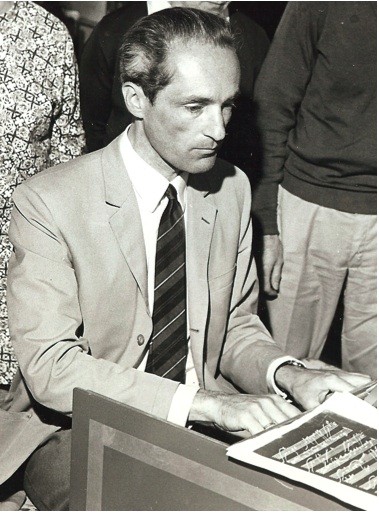It’s so sad that Gustav Leonhardt is no more.
I first heard him, partnered by Frans Brüggen in a concert in St Albans. Since then, I’ve seen him many times and, apart from the extraordinary playing, have often been struck by the fact that he mostly used his own elegant manuscript scores, presumably copied from ancient tomes during his early years in Vienna.
And I must be one of the few who has heard him sing inner parts, in a flutey falsetto, to demonstrate some quirk of counterpoint. I remember that at that particular lecture, he brought along 20 copies of beautifully hand-written musical examples for what turned out to be a group of more than a hundred, on a week-day afternoon.
Despite his age – he was 83 when he died on 16 January – he didn’t really slow down till the end, still travelling all over the world, giving around a hundred concerts a year. Online reviews show that he was recently in St Petersburg and Istanbul, where he was described respectively as “baron of the baroque” and “the lion of the harpsichord”.
Leonhardt stopped making CDs a while back, saying that he’d recorded all he wanted to; his teaching career – with only ever a maximum of six hand-picked students at a time – had ended much earlier (apart from master classes), with his ex-student Bob van Asperen stepping up at the Amsterdam Conservatorium.
In the course of his long life, he gave many interviews, and I’ve been collecting them, in French, German, Dutch and English. I’ve always been amazed by the consistency with which he said almost exactly the same things, which represented the part of his life that he wanted to share. For example, he became “keyboard man” for his parent’s almost daily chamber music sessions at the age of 10; and his teacher Eduard Müller at the Schola Cantorum Basiliensis taught him not to change keyboards too much on the organ.
It was in this institution, established by Paul Sacher, who was inspired by the performances of Wanda Landowska, that he was to meet his future wife, Marie.
He started his performing career with J.S. Bach, and Bach remained a constant throughout his life. Leonhardt once commented that he thought that it was scandalous that he, as a mere performer, lived in a much grander house (a national monument on seven floors, built in 1617) than Bach had ever known; and that he (i.e. Bach) had composed the greatest music that exists!
I’ve been in contact with his sister, the fortepianist, Trudelies Leonhardt, and am working on a post about their childhood together with their “fanatically” cultured parents. Some explanation of how this family produced two such talented musicians may be found in the nurture and the extraordinary opportunities that they received in the family home.
I was curious about this largely unknown part of his life, which included a Bechstein grand, an 18th-century Müller chamber organ, with a pedalboard, which the young Gustav initially couldn’t quite reach, having to enlist the help of his sister to play the pedal part in Bach’s famous Toccata and Fugue in D minor.
That important instrument went up in flames while it was being restored a few years ago. Gustav’s parents had showed remarkable discernment in buying it; obviously he couldn’t have been consulted on its acquisition, for, although he apparently played it, he didn’t become interested in historical organs till he was in his teens. His father, George (a partner in Peck and Co., which laid on the water supply of Amsterdam), was on the board of the Dutch Bach Society, and no doubt used contacts made there in deciding to purchase this now-lost gem.
This association also led the young Gustav to attend both rehearsals and performances of the St Matthew Passion, given by the Dutch Bach Society, in the Grote Kerk in Naarden and conducted by Anthon van der Horst, who was to become his teacher while he was still at school.
More, when I’ve been able to pull everything together. For now, just huge regret that this great musician has left us.
See Leonhardt’s last ever concert here, given in Paris in December 2011.


[…] scomparsa di Leonhardt si chiude un’era, come titola giustamente l’autore di un elogium in un blog che vi consiglio di tenere d’occhio. L’era dello scavo filologico (rigoroso ma mai pedante), del […]